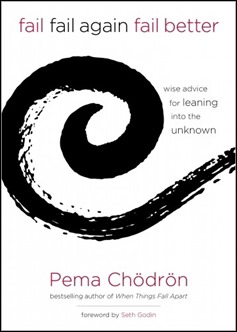Fail, Fail Again, Fail Better

Ani Pema Chodron, the author of the book, gave a commencement address to the 2014 graduating class of Naropa, University of Boulder, Colorado. She did so, to keep her promise with her grand daughter, who was amongst the graduating class. The speech went viral on the net and this book is an offshoot of it. It contains the full text of the speech and a Q&A session. The title of the speech and hence the book, is inspired from a quote by Samuel Beckett.
The author says that she had received one of the best pieces of advice, while learning how to teach.
I was being taught how to teach, as many of us were. And the instructions I received were to prepare well, know your subject, and then go in there with no note cards. Honestly, that is the best advice for life: no note cards. Just prepare well and know what you want to do. Give it your best, but you really don’t have a clue what’s going to happen. And note cards have limited usefulness.
The crux of the speech is author’s take on how to fail ? Most of the strategies that we adopt when faced with failure fall in to two categories. We either blame it on something external or become excessively critical about our self. How does one handle a failure ?
The author says,
We move away from the rawness, of holding the rawness of vulnerability in our heart, by blaming it on the other. Getting curious about outer circumstances and how they are impacting you, noticing what words come out and what your internal discussion is, this is the key.
So sometimes you can take rawness and vulnerability and turn it into creative poetry, writing, dance, music, song. Artists have done this from the beginning of time. Turn it into something that communicates to other people, and out of this raw and vulnerable space, communication really happens.
It’s in that space-when we aren’t masking ourselves or trying to make circumstances go away-that our best qualities begin to shine.